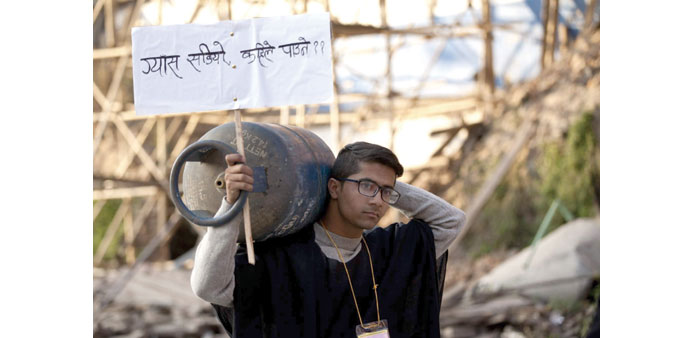A man carrying an empty gas cylinder attends a silent protest against the government in Kathmandu yesterday.
DPA
Kathmandu
Protests against a reorganisation of political borders that many say will leave them without a voice turned violent in Nepal yesterday, as police and protesters clashed in Sunsari district in southeastern Nepal, authorities said.
Police and protesters clashed in Duhabi after demonstrators interrupted a peace rally, according to the chief district office of Sunsari. Police fired tear gas to disperse the crowd.
It wasn’t clear how many people were hurt in the clash. An ambulance also came under attack by protesters, during which the driver was injured, according to the local media.
Demonstrations against the changes, included in a new constitution, have shut down many towns in the southern plains of Nepal, crippling markets and transportation. Schools have been shut for months.
At issue is the federal structure in the new constitution that changes borders on many governmental districts.
Protesters from the Madhesi community - which has affinities with India - say they want a separate state dedicated to their community. But politicians at the centre have been resisting, saying it would make the Madhesi community powerful and undermine the other ethnic groups that reside in the plains.
In Biratnagar district, a passenger bus was attacked by protesters. In Nawalparasi district, two motorbikes were vandalised. In Birganj, two motorbikes were torched.
In Janakpur, a man was injured when a bomb exploded in a residential area. Police said they were not sure who planted the bomb.
The Terai region has seen 89 days of strikes, which has had a severe impact on not just the plains, but on the rest of Nepal, as India closed the border between the two countries citing security reasons.
Imports from India to Nepal, notably petrol, have been blocked for the last three months, with the border effectively closed due to what India has called security concerns. Nearly 50 people have been killed in violence during the protests.
However, the talks between the government and the protesting sides in Nepal has seen little success, as the demonstrators say they will not back down unless the government amends the constitution to give them more autonomy in the new constitution.
As the protests continued yesterday, the three main parties were deliberating ways to amend the federal structure.
The anti-constitution protests began in the plains as soon as the government released the draft constitution in early August, before promulgating it on
September 20.
A new constitution was a requirement of the comprehensive peace accord signed by the government and the Maoists in 2006, which put an end to a decade-long constitution.
On Friday, Nepal’s Central Bank said that the country’s economic growth rate could turn to negative for the first time in 33 years.

